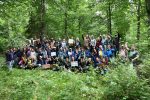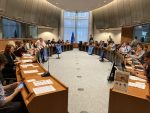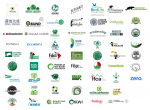What is actually going on in the bioeconomy debate at EU level and in our neighboring European countries? And how do our colleagues from the environmental and development associations assess the respective national discussions on the bioeconomy?
This is the subject of the short study “Shaping Bioeconomy Strategies in Europe: The Role of Civil Society”. In it, author Wolfgang Kuhlmann, commissioned by the Bioeconomy Action Forum, describes the main European policy processes and highlights the debate in Finland, Sweden, Estonia, Italy, France and the Netherlands. The focus here is particularly on the role of civil society.
Even if the paper does not claim to be exhaustive, it does show one thing: Looking beyond the German horizon provides fresh impetus.
Summary of the Study
The EU Bioeconomy Strategy stresses the role of bio-based products as alter- natives to fossil-fuel counterparts, and their importance in developing a sustain- able economy based on renewable materials in Europe. It encourages member states to develop national bioeconomy strategies or equivalent policies that enhance the cooperation between primary producers (in agriculture, forestry or fisheries) and bio-based industries.
Currently, nine EU member states (Austria, Finland, France, Germany, Ireland, Italy, Latvia, Spain, and the Netherlands) have a national strategy while others are involved in national or regional bioeconomy development. All have in common that they are primarily geared at enhancing the cooperation of govern- ment agencies and bio-based industry with support of science and primary producers. This is mainly done through the provision of public funds to research and development.
This study takes a closer look at the role of civil society in the development and implementation of bioeconomy strategies in the EU, Finland, Sweden, Estonia, Italy, France and the Netherlands. While the bio-based industry is well organized and well-funded, civil society involvement in drafting and imple- menting bioeconomy strategies at EU or member state level has up to now remained limited.
Although all policy documents related to bioeconomy mention “stakeholder participation” in some way or another, respective stakeholder consultations primarily address state and regional authorities, industry and their associations as well as members of the scientific community. While the opinion of individual citizens is at best taken note of in scientific studies on attitudes towards the bioeconomy, participation of representatives like non-governmental organisa- tions has in most cases only been sporadic. Formal consultation processes are lacking in most countries or are restricted to requests for written comments.
Adding to a lack of political will, participation is also hampered by a lack
of financial resources that limits NGO activities in this field. By contrast, the biotech industry has ample means and lobby power to influence politics in their favour.
This changes, when it becomes evident that the resource needs of bio-based industry may lead to an overexploitation of ecosystems or may adversely affect the livelihoods of local communities. This is the case in Finland and Sweden, where new biorefineries are pushing timber harvests to their limits, or in France and the Netherlands, where imports of biomass for the production of biofuels or for co-firing in coal power plants are not in line with sustainability criteria.
Making sure that planetary boundaries are respected and that all biomass used for bioenergy or the production of bio-based materials is sourced sustain- ably, is one of the main goals of environment and development NGOs. For many citizens, this also is a basic requirement for a broader acceptance of the bioeconomy.
These are some of the reasons for civil society and their organisations to play a stronger role in developing and implementing policies and guidelines for a bioeconomy that is environmentally sound, socially just and provides a genuine contribution to climate and biodiversity protection.
It is time for civil society to change from an observer on the side line to the centre of the playing field. This requires more than routinely mentioning stake- holder participation in policy papers. Moving from paper to practise will not only need inclusive fora for dialogue but also adequate resources to do so.







